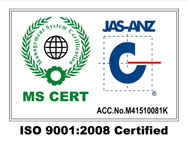QA / QC
 Our in-house inspection specialists measure the quality of our work throughout the manufacturing process, as well as final product testing. We perform ASNT Non-Destructive Testing including: Mag-Particle Testing, Dye-Penetrant Testing and Ultrasonic Testing.
Our in-house inspection specialists measure the quality of our work throughout the manufacturing process, as well as final product testing. We perform ASNT Non-Destructive Testing including: Mag-Particle Testing, Dye-Penetrant Testing and Ultrasonic Testing.
 Our skilled inspectors are equipped with state of the art tools including the latest FARO Arm, the FARO Edge. The FARO arm is a 3D coordinate measuring machine used for measuring the physical geometrical characteristics of an object. A machine which takes readings in six degrees of freedom and displays these readings in mathematical form is known as a CMM.
Our skilled inspectors are equipped with state of the art tools including the latest FARO Arm, the FARO Edge. The FARO arm is a 3D coordinate measuring machine used for measuring the physical geometrical characteristics of an object. A machine which takes readings in six degrees of freedom and displays these readings in mathematical form is known as a CMM.
 We utilize Positive Material Identification (PMI) Guns. Positive Material Identification is the analysis of a metallic alloy to establish composition. Positive Materials Identification (PMI) enables a component’s material grade or chemical analysis to be found. Positive Material Identification (PMI) is one of the more specialized non-destructive testing methods. With Positive Material Identification the alloy composition of materials can be determined. If a material certificate is missing or it is not clear what the composition of a material is, then PMI offers the solution. PMI is particularly used for high-quality metals like stainless steel and high alloy metals.
We utilize Positive Material Identification (PMI) Guns. Positive Material Identification is the analysis of a metallic alloy to establish composition. Positive Materials Identification (PMI) enables a component’s material grade or chemical analysis to be found. Positive Material Identification (PMI) is one of the more specialized non-destructive testing methods. With Positive Material Identification the alloy composition of materials can be determined. If a material certificate is missing or it is not clear what the composition of a material is, then PMI offers the solution. PMI is particularly used for high-quality metals like stainless steel and high alloy metals.
Mag-particle Testing
We use MT to find cracks & discontinuities on the surface. Each test comes with a certified report. Magnetic particle inspection (MPI) is a non-destructive testing (NDT) process for detecting surface and slightly subsurface discontinuities in ferroelectric materials such as iron, nickel, cobalt, and other alloys. The process puts a magneticfield into the part.
Ultra-Sonic Testing
We use UT to find flaws and discontinuities on the surface of a workpiece. Each Test comes with a certified report. In ultrasonic testing (UT), very short ultrasonic pulse-waves with center frequencies are launched into materials to detect internal flaws or to characterize materials.
Dye-Penetrant Testing
We use D.P.I. to find flaws in surface cracks. Each test comes with a certified report. Dye penetrant inspection (DPI), also called liquid penetrant inspection (LPI) or penetrant testing (PT), is used to locate surface-breaking defects in all non-porous materials (metals, plastics, or ceramics). LPI is used to detect casting, forging and welding surface defects such as hairline cracks, surface porosity, leaks in new products, and fatigue cracks on in-service components.




